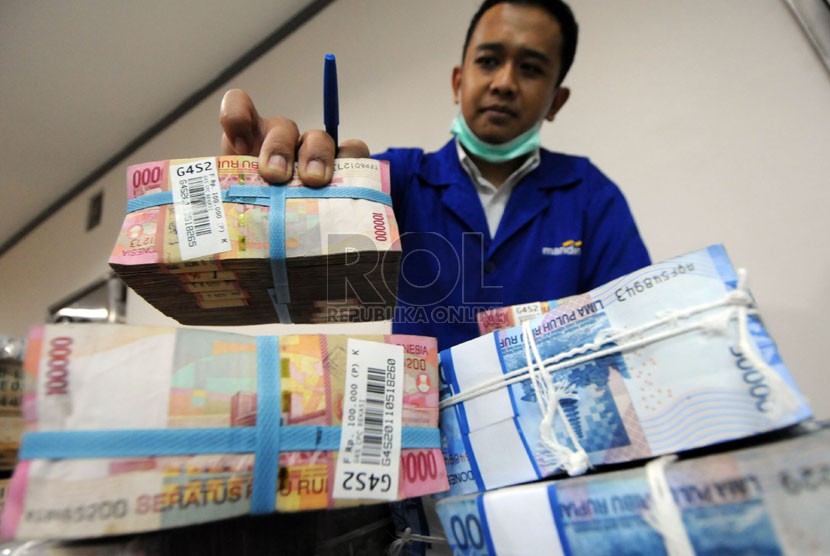REPUBLIKA.CO.ID JAKARTA -- By Andi Abdussalam
The Indonesian central bank, Bank Indonesia (BI), hopes that the rupiah, which has depreciated over the past four months, will appreciate in the first semester or at the beginning of the second semester of 2014.
The rupiah has been weakening since September, this year, when it tumbled to Rp10 thousand per US$1, from below the Rp9.7 thousand level, in May and July. This month, the rupiah has been hovering around Rp12 thousand per US dollar.
On Friday evening, the rupiah exchange rate against the Greenback, weakened 73 points at the interbank market, from Rp12,201 to Rp12,274.
"The dollar bounced back again following strong data that the US economy is recovering and strengthened its market perspective that the Federal Reserve will continue its tapering-off program," stated Monex Investindo Futures's Head of Research, Ariston Tjendra, on Friday.
According to Tjendra, the current US economy is strong enough to sustain the appreciated US dollar until the year-end, as well as to convince the investors that the Federal Reserve will continue its tapering off initiative.
"However, the currency market tends to flatten on presumptions that no major event will take place during the last week of 2013," he noted.
On Monday (Dec.30), the rupiah value was unchanged against the US dollar in the opening trade, analysts remarked.
The rupiah traded at 12,274 per US dollar in interbank transactions, during the first minute of trading on Monday, chief researcher of Trust Securities, Reza Priyambada, claimed.
"Ahead of the year-end, the rupiah value tends to remain flat, but there is a possibility of greater pressure due to the higher US economic growth in the third quarter," Reza noted.
The impact of the Fed trimming its massive financial stimulus also continues to shadow the rupiah movements, he added.
In January, 2014, the Fed plans to cut its bond buying program from US$85 billion to US$75 billion a month.
However, Bank Indonesia (BI) is optimistic that the rupiah currency will strengthen in 2014, in line with improved economic fundamentals and a decline in the country's current account deficit.
"With improving economic fundamentals, such as the decline in the country's current account deficit, the rupiah value against the US dollar will strengthen," Executive Director of BI's Monetary and Economic Policy Department Doddy Budi Waluyo stated over the weekend.
He announced that the implementation of the legislative and presidential elections in 2014 will not have a negative impact on the rupiah exchange value.
The same optimism was also mirrored by other BI executives. The central bank stated that it was optimistic that the rupiah will strengthen after the inflation and imports were brought under control in 2014.
"We are convinced that the rupiah will strengthen after the general elections next year," Executive Director of BI's Communications Department Difi A. Johansyah remarked.
He mentioned that the fall of the rupiah against the US dollar, which this time tumbled to over Rp12 thousand, was something that often occurred during the year-end period.
Difi forecast that the rupiah will appreciate at the end of the first semester or at the beginning of the second semester of 2014, when the rupiah value against the Greenback increased to below Rp11 thousand.
According to the BI director, the fall of the rupiah value was not a doomsday. One of the causes of the depreciating rupiah value was the high imports, which boosted the demand for foreign exchange.
"In countries having a strong production base, depreciation of their local currencies worked in favor of the local producers," he added.
The BI conviction that the rupiah will strengthen next year, is based on its prediction that the country's economic fundamentals will improve in 2014.
Earlier, BI Governor Agus Martowardojo had predicted the country's current account deficit by the year-end, will be slightly lower at 3.5 percent of the country's Gross Domestic Product (GDP), as compared to 3.8 percent in the third quarter.
"By the end of the year, the current account deficit can be at 3.5 percent. At present, the current account shows an encouraging trend," BI Governor Agus Martowardojo remarked.
Executive Director of BI's Monetary and Economic Policy Department Doddy Budi Waluyo predicted that the current account deficit in 2014 will decline to US$25-US$26 billion or about 2.9 percent of the GDP.
"We are hopeful that the current account deficit will dip to 2.9 percent, to approach the moderate rate of 2.5 percent of the GDP," he added.
Doddy informed that in nominal term, Indonesia's current account deficit, at the end of 2013, will stand at US$31 billion, while in 2014, it is expected to decrease to a value between US$25 million and US$26 billion.
The BI also estimated that the inflation rate can be further controlled and returned to its normal level at a range of 4.5 plus-minus one percent in 2014.
In November 2013, the Central Bureau of Statistics recorded the inflation rate at 7.79 percent, while the year-on-year inflation was recorded at 8.37 percent.
"Under such conditions, the rupiah value should not necessarily weaken in 2014," Doddy claimed.
The BI executive director added that the country's current account deficit had shown an increase for a span of nine consecutive quarters, where until the second quarter of 2013, it reached 4.4 percent of the GDP.
He hoped that the high imports that had taken place during 2013, will be balanced by higher exports in 2014. Indonesia's non-oil and non-gas export performance is also showing an improvement after the United States and China's economies have shown a positive trend and their imports have also begun to increase.
The government should be heedful to the predicted increase in oil and gas imports as a result of the increase in the domestic sales of motor vehicles.


